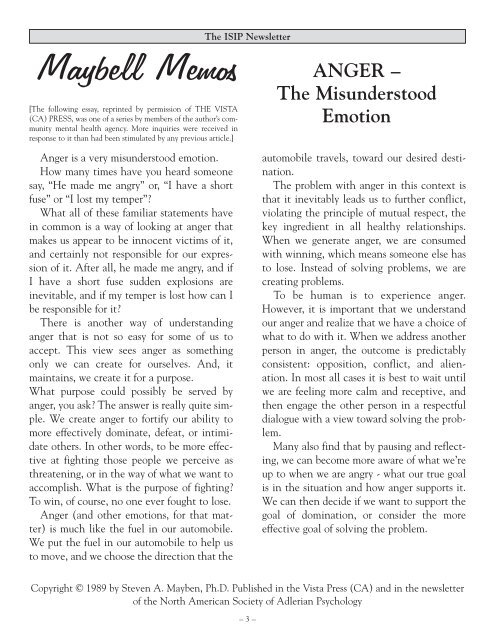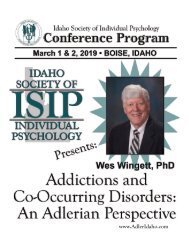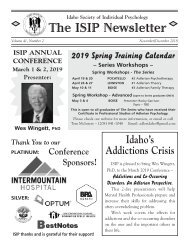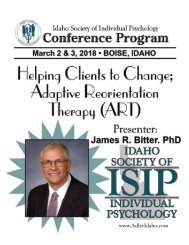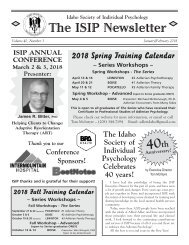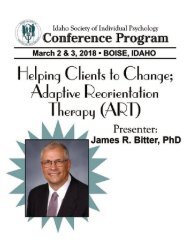ISIP Nov-Dec 2017 Newsletter
Create successful ePaper yourself
Turn your PDF publications into a flip-book with our unique Google optimized e-Paper software.
The <strong>ISIP</strong> <strong>Newsletter</strong><br />
Maybell Memos<br />
[The following essay, reprinted by permission of THE VISTA<br />
(CA) PRESS, was one of a series by members of the author’s community<br />
mental health agency. More inquiries were received in<br />
response to it than had been stimulated by any previous article.]<br />
Anger is a very misunderstood emotion.<br />
How many times have you heard someone<br />
say, “He made me angry” or, “I have a short<br />
fuse” or “I lost my temper”?<br />
What all of these familiar statements have<br />
in common is a way of looking at anger that<br />
makes us appear to be innocent victims of it,<br />
and certainly not responsible for our expression<br />
of it. After all, he made me angry, and if<br />
I have a short fuse sudden explosions are<br />
inevitable, and if my temper is lost how can I<br />
be responsible for it?<br />
There is another way of understanding<br />
anger that is not so easy for some of us to<br />
accept. This view sees anger as something<br />
only we can create for ourselves. And, it<br />
maintains, we create it for a purpose.<br />
What purpose could possibly be served by<br />
anger, you ask? The answer is really quite simple.<br />
We create anger to fortify our ability to<br />
more effectively dominate, defeat, or intimidate<br />
others. In other words, to be more effective<br />
at fighting those people we perceive as<br />
threatening, or in the way of what we want to<br />
accomplish. What is the purpose of fighting?<br />
To win, of course, no one ever fought to lose.<br />
Anger (and other emotions, for that matter)<br />
is much like the fuel in our automobile.<br />
We put the fuel in our automobile to help us<br />
to move, and we choose the direction that the<br />
ANGER –<br />
The Misunderstood<br />
Emotion<br />
automobile travels, toward our desired destination.<br />
The problem with anger in this context is<br />
that it inevitably leads us to further conflict,<br />
violating the principle of mutual respect, the<br />
key ingredient in all healthy relationships.<br />
When we generate anger, we are consumed<br />
with winning, which means someone else has<br />
to lose. Instead of solving problems, we are<br />
creating problems.<br />
To be human is to experience anger.<br />
However, it is important that we understand<br />
our anger and realize that we have a choice of<br />
what to do with it. When we address another<br />
person in anger, the outcome is predictably<br />
consistent: opposition, conflict, and alienation.<br />
In most all cases it is best to wait until<br />
we are feeling more calm and receptive, and<br />
then engage the other person in a respectful<br />
dialogue with a view toward solving the problem.<br />
Many also find that by pausing and reflecting,<br />
we can become more aware of what we’re<br />
up to when we are angry - what our true goal<br />
is in the situation and how anger supports it.<br />
We can then decide if we want to support the<br />
goal of domination, or consider the more<br />
effective goal of solving the problem.<br />
Copyright © 1989 by Steven A. Mayben, Ph.D. Published in the Vista Press (CA) and in the newsletter<br />
of the North American Society of Adlerian Psychology<br />
– 3 –


